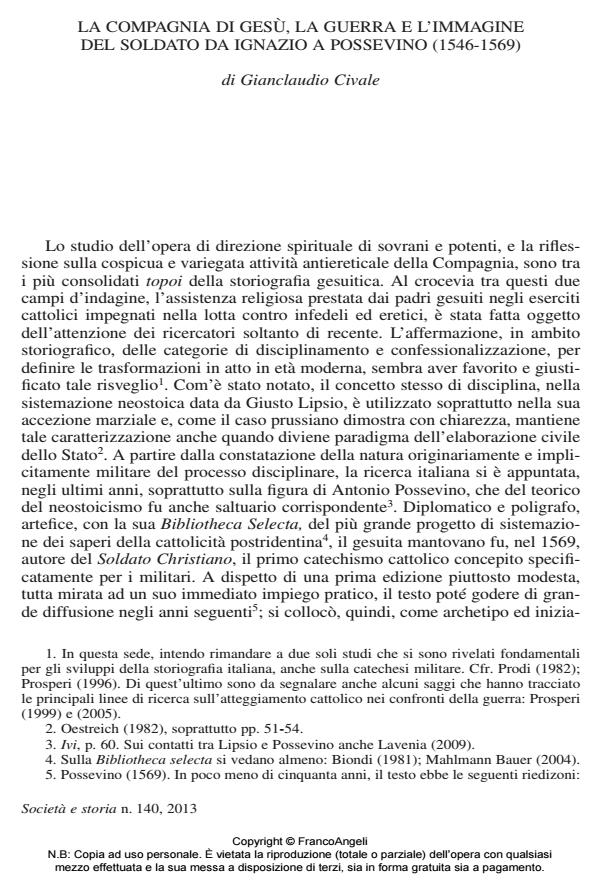The Society of Jesus, the war and the image of the soldier from Ignatius to Possevino (1546-1569)
Journal title SOCIETÀ E STORIA
Author/s Gianclaudio Civale
Publishing Year 2013 Issue 2013/140
Language Italian Pages 35 P. 283-317 File size 554 KB
DOI 10.3280/SS2013-140003
DOI is like a bar code for intellectual property: to have more infomation
click here
Below, you can see the article first page
If you want to buy this article in PDF format, you can do it, following the instructions to buy download credits

FrancoAngeli is member of Publishers International Linking Association, Inc (PILA), a not-for-profit association which run the CrossRef service enabling links to and from online scholarly content.
Analyzing the language of early Jesuit writings, the essay examines the representation of the Society of Jesus as a spiritual militia and the justification of the use of arms within a more complex campaign of religious conquest waged against heretics and infidels. With the participation of the first Jesuits in the Spanish armies involved, in the mid-sixteenth century, in the Mediterranean theatre of war against the Turks and Barbary corsairs, the Order developed a particular pastoral sensitivity towards men-atarms. This concern, under the direction of Francis Borgia (1510-1572), third Jesuit General, led to a structural commitment of the Society in the Catholic armies. In the transition from confrontation with the Muslims to European confessional conflicts, one of the most significant advances of the Jesuit attitude towards the military lay in the adoption of religion as a ‘disciplining’ resource, in order to maintain cohesive and motivated armies. In the France of the first wars of religion, the works and the apostolate of Jesuits such as Emond Auger (1530-1591) and Antonio Possevino (1533-1611) led to the rise, on both confessional sides, of a common requirement of "moralization" of the profession of arms and to a parallel effort to put religious observance at the base of martial discipline. This phenomenon could be regarded as an attempt to the "confessionaliza tion" of the military profession aimed at the definition of a new model of an ideal soldier, which lies between the decline of chivalry and the looming neostoic archetype delineated by Justus Lipsius.
Keywords: Society of Jesus, Possevino, war, military chaplains, military discipline, confessionalization
- Metodo, ragione, guerra. La letteratura catechetica per i soldati nel XVIII secolo Vincenzo Lavenia, in SOCIETÀ E STORIA 154/2017 pp.767
DOI: 10.3280/SS2016-154008 - Quale storia della società? Uno sguardo sull'epoca moderna Paola Bianchi, in SOCIETÀ E STORIA 178/2023 pp.711
DOI: 10.3280/SS2022-178005 - 'Una porta para Turquia': The Society of Jesus and the Republic of Ragusa (1559–1612) Silvia Notarfonso, in Jesuit Educational Quarterly /2025 pp.353
DOI: 10.51238/cLyL3qp
Gianclaudio Civale, La Compagnia di Gesù, la guerra e l’immagine del soldato da Ignazio a Possevino (1546-1569) in "SOCIETÀ E STORIA " 140/2013, pp 283-317, DOI: 10.3280/SS2013-140003